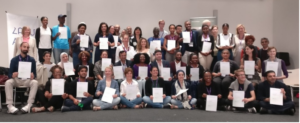
2017 Diaspora Dialogues
For as long as I can remember, I have always cared about fairness. Even as a kid, I had a pretty clear idea of what it meant to act fairly. In time, that internal driver found expression as a passion for justice, which I defined as treating all people with respect—no matter who they are or what they believe. Precisely what that would come to mean, however, was not always clear and certainly not static.
As society’s understanding of identity expanded over decades, my own view of what it meant to practice justice likewise evolved. Now, far into my justice journey, I have discovered yet another identity that resonates with me. One that offers me a new, powerful vehicle for working toward global justice. In a phrase, I am talking about diaspora identities.
To explain what I mean, it is worth reflecting on how I got here. In part, it started with anti-Semitism. I am Jewish and was about seven years old when I first felt the paralyzing pain of hearing the kids on the block call my little brother “Jew bastard” and “Christ killer.” I asked them to stop, to apologize, but they kept repeating their taunts. I’ve always remembered that moment, and it became my lens for understanding others.
I felt pained by the lack of basic respect and equality societally allowed to African-Americans. But when Rev. Martin Luther King Jr. called on us to judge his children by the content of their character and not the color of their skin, my sense of justice crystalized. That was what justice should look like—for every child.
In the years that ensued, I learned more about the ways different identities are targeted. I realized how the bias inflicted on African-Americans also attaches to other people of color, though not always in the same ways. That women do not have the same opportunities as their male counterparts, not only because of sexual harassment, but also because, institutionally, women are not paid equally for the same work. I came to recognize that people have many identities including those that result in injustice and marginalization—their sexual orientations, gender identities, disabilities, age, economic and social backgrounds, etc. And always, there is religion, a core identity that far too often is used to divide and fuel conflict, and that becomes a target for prejudice, hatred and violence.
Now, I have another new identity, one that holds promise for more global connections, constructive collaborations and justice.
Last week, I attended an unusual international conference convened by Common Purpose. Called the Diaspora Dialogues, they identified diaspora leaders from across diverse communities and brought them together in Armenia. The goal was to consider whether and how the power of distinct diaspora leaders of all ages could be harnessed for global good.
When I was invited to go, I hesitated. For one thing, while I am Jewish and therefore a member of the Jewish diaspora, I am not a leader in that community. In addition, my work at Tanenbaum is based on combating prejudice directed at people from every faith and none, and we do this work from a secular and nonsectarian perspective. However, as I thought more about it, I realized that being part of the Jewish diaspora was, in fact, part of who I am. In different places around the world, I have been stopped by total strangers, looking at me and saying “Jewish!” In each instance, they were identifying a fellow from their tribe. I also had an unexpected reaction when I first visited Israel. It was the only time in my life that the majority of people around me were somehow brethren. In that, there was a sense of belonging and safety that I have not experienced anywhere else on earth.
Given this awareness and as a person with leadership responsibilities as Tanenbaum’s CEO, I agreed to attend. Approximately 60 people from a range of diaspora identities convened. Most were people who were born in one country, and now lived in another nation. Some had ties to several countries. Most of the participants could identify as a member of a diaspora (Nigerian, Pakistani, etc.) based on the reality that they did not live in their birth/home country. A few of us were diaspora because of our religious identity, as Jews.
Like me, many were thinking deeply about this diaspora identity for the first time, although others had already embraced it, including in their daily work. Even though the ways we came to be among a diaspora differed, we all had a lot in common, perhaps because of how we were selected. We were’s all strivers and wanted to do something to better our communities or the world. We could identify shared experiences around not belonging, as we owned our diaspora identities and experiences.
Therein, lie the possibilities. Right now, across the globe we are dangerously divided by our different identities and our different beliefs. This manifests in political divisions and global conflicts. Working across diverse diaspora identities suggests new possibilities of identifying common ground and creating novel opportunities for problem-solving and collaboration. This vision was embedded in Common Purpose’s program with us and its long-term thinking. As one of the people who explored the possibilities with them, I was moved to see the power and potential in this effort.
Together, diaspora leaders and diaspora community members have an opportunity to tackle big and small problems—and to create greater justice for all. Count me in!
*This post originally appeared on HuffPo on October 19, 2017